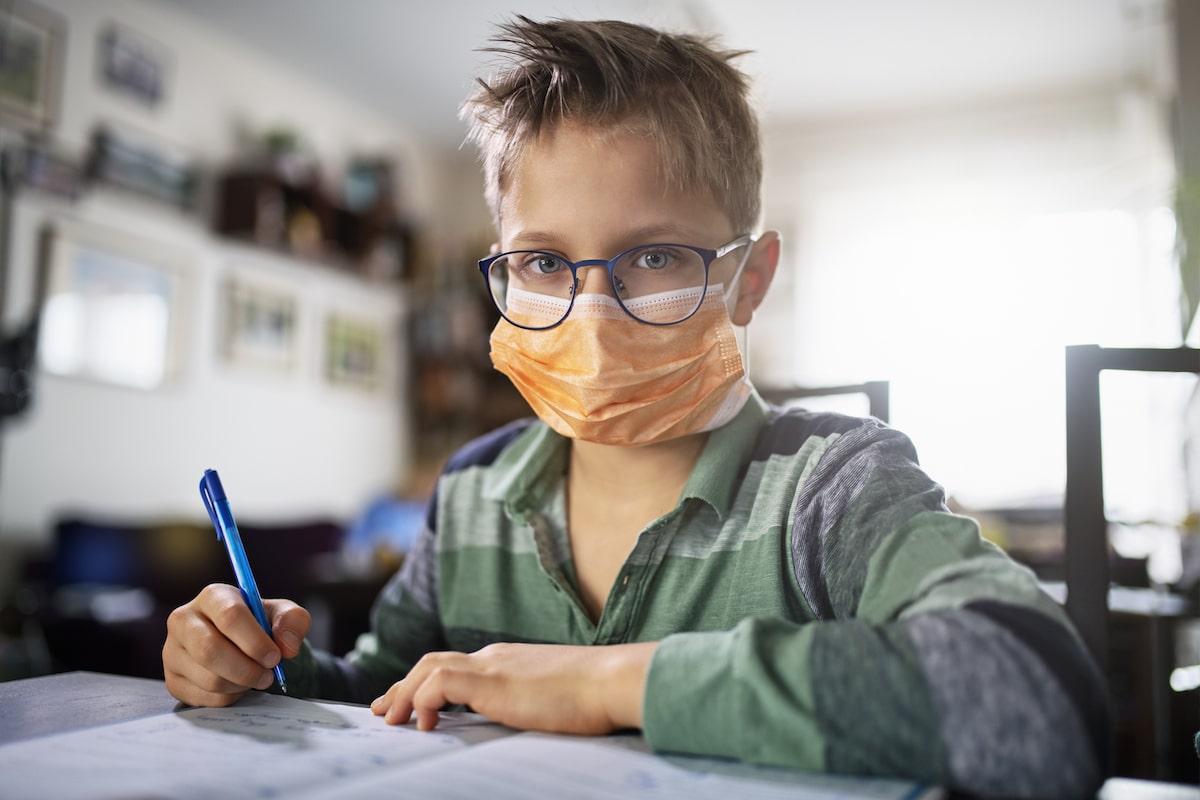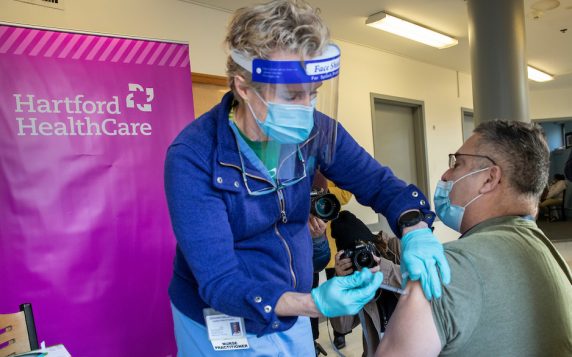With the expected approval of the Pfizer COVID-19 vaccine for 5-11 year olds, you probably have questions about COVID vaccines for children. We’ve got the answers from experts who should know: The Pediatric Care Alliance, a partnership between Connecticut Children’s Medical Center and Hartford HealthCare.
Pfizer-BioNTech recently announced that its COVID-19 vaccine is safe and highly effective for children aged 5 to 11, the next group in line for the shot. (Ages 12 and up are already eligible.)
The company shared its clinical trial data with the Food and Drug Administration (FDA), kicking off a review process that could move quickly.
To help parents prepare, Connecticut Children’s infectious disease expert John R. Schreiber, MD, MPH, answers common questions about the vaccine and younger kids.
If Pfizer says its vaccine is safe and effective for ages 5 to 11, why isn’t it available yet?
Pfizer made the announcement based on months of clinical trials, led by its own experts. But outside experts from the FDA still need to review and confirm their findings, and decide whether to extend the vaccine’s emergency use authorization to this age group.
How long will the FDA review take?
The FDA advisory committee is scheduled to meet Oct. 26 to discuss Pfizer’s vaccine for younger kids. That’s usually the last step before the FDA gives its decision.
So what’s the earliest the COVID-19 vaccine could be available for ages 5 and up?
It depends how smoothly the review process goes, and what we learn on Oct. 26. If all goes well, it’s possible the FDA could authorize the vaccine for younger kids before the end of October.
That means that, best-case scenario, ages 5 to 11 could start receiving the Pfizer vaccine sometime between Halloween and Thanksgiving.
Is the Pfizer vaccine for ages 5 to 11 any different from the Pfizer vaccine for ages 12 and up?
It’s the exact same vaccine, made with the same mRNA technology. But it’s delivered in a low dosage: just 10 micrograms per shot, a third of the dosage for adolescents and adults. As with older ages, the vaccine is given in two shots, spaced three weeks apart.
What was Pfizer’s testing process for the vaccine in this age group?
The clinical trial for ages 5 to 11 included 2,268 kids. Two-thirds received the vaccine, and the other third received a placebo for comparison. Over a number of months, Pfizer tested different dosages to find the best one for this age group’s immune system.
Is the Pfizer vaccine safe for kids ages 5 to 11?
Yes, Pfizer says the vaccine is safe and effective for this age group.
The FDA will work to make sure of it, by having its own experts double-check the clinical trial results. (They’ll also take into account the safety data from millions of individuals ages 12 and up who have already received the vaccine in its original, higher dosage.)
Does the COVID-19 vaccine cause any new or different side effects for 5- to 11-year-olds?
No. In the 24 hours after their shot, younger kids may experience the usual short-term side effects: a sore arm, fever, chills or headache. This is similar to what we’ve seen in adolescents and adults, although Pfizer says that fever and chills are a bit less common in the 5- to 11-year-olds.
Keep in mind that many other vaccines, like the flu shot, have similar side effects. Not everyone experiences them, but when they do, it’s just a normal sign of the body’s immune system working. Side effects are usually mild and go away in about a day.
What about rare reports of myocarditis in vaccinated teens and young adults? Is this a risk for younger kids who get the COVID-19 vaccine?
I know this question is top of mind for many parents. The FDA will have it top of mind too, as they review the clinical data from Pfizer’s vaccine trials for 5- to 11-year-olds.
In the meantime, here are a couple things to keep in mind. For ages 12 and up, the CDC has continued to recommend the COVID-19 vaccine, because protection from the virus outweighs any potential risks. In the rare reports of myocarditis and pericarditis in young people after Pfizer’s or Moderna’s vaccines, cases have mostly been mild and gone away on their own.
Plus, these cases are rare. In fact, a recent study shows that COVID-19 infection is actually much more likely to cause myocarditis than getting the vaccine. In other words, one way to protect your child from myocarditis is getting their COVID-19 vaccine.
Will the Pfizer vaccine be as effective for ages 5 to 11 as it is for older kids?
Yes. Pfizer says their COVID-19 vaccine provided a strong immune response in 5- to 11-year-olds, similar to its effectiveness in ages 16 and up. That’s around 80 to 90 percent effective at preventing serious illness.
My child is healthy. How important is it for them to get the COVID-19 vaccine?
It’s very important. With the spread of the Delta variant, particularly among the unvaccinated, cases in kids have increased nearly 240% in the U.S. since July. Kids now make up nearly 1 out of every 4 reported COVID-19 cases.
While many kids don’t become seriously sick from COVID-19, some do, including with a serious inflammatory syndrome, MIS-C. More and more kids across the country are being hospitalized. And we’re still working to understand the long-term effects of “long COVID.”
Plus, lots of schools have different quarantine requirements for students who are fully vaccinated. When a classmate tests positive, a child who’s fully vaccinated may be able to return to the classroom with just a negative COVID-19 test. A child who isn’t may need to quarantine at home for 10 to 14 days.
A COVID-19 vaccine may be your child’s best way to fully participate in school, sports and activities they love. It’ll also keep them safe, and everyone else they come in contact with.
If my child already had COVID-19, should they still get the vaccine?
Yes, the CDC recommends that they still get the COVID-19 vaccine.
Is there any reason my child should NOT get the vaccine – for example, if they have a certain underlying health issue?
Your child’s pediatrician is always the best resource if you have questions about your child and the COVID-19 vaccine, so reach out to them if you have specific concerns.
But in general, almost every eligible child should get the vaccine. One exception is kids who have had a severe allergic reaction to a similar vaccine, but these cases are usually very rare.
Will it be safe for my child to get the COVID-19 vaccine at the same time as their annual immunizations?
Yes. The CDC and American Academy of Pediatrics say it’s safe for kids to get routine vaccines like the flu shot at the same time they get a COVID-19 vaccine. It’s important for your child to be up-to-date on all their vaccines, so don’t delay!
Besides Pfizer, will any other COVID-19 vaccines be available for kids under 12?
It’s possible that Moderna will share results and apply for FDA emergency use authorization in the coming months. The company has been holding clinical trials for ages 6 to 11, and previously said they expected to share results this fall.
Johnson & Johnson and Novavax are still collecting information about their vaccines in ages 12 to 17.
For now, the COVID-19 vaccine is only available for ages 12 and up.
If your children are old enough, please make sure they’re fully vaccinated.
Dr. John R. Schreiber is an Infectious Diseases Specialist at Connecticut Children’s.


